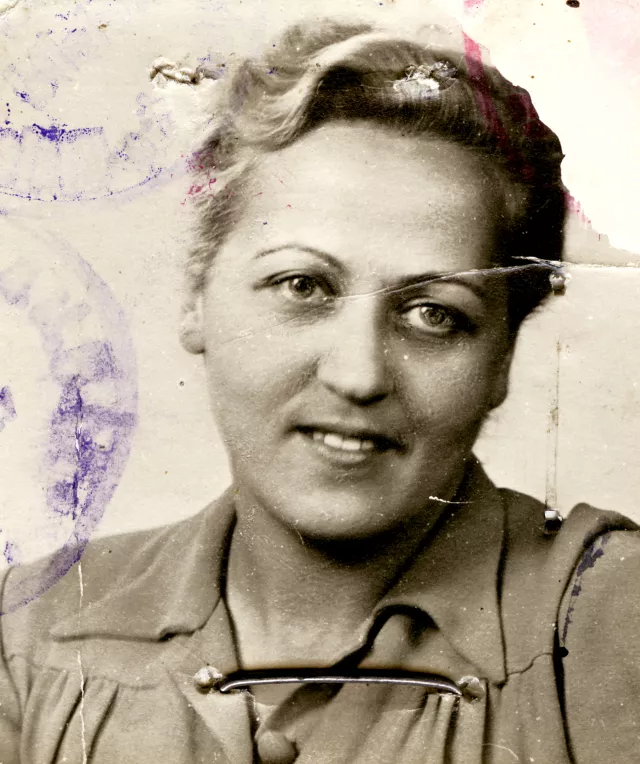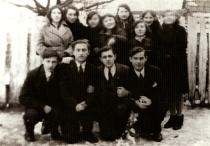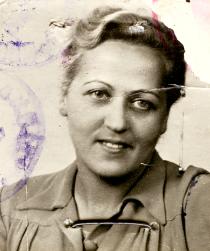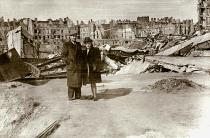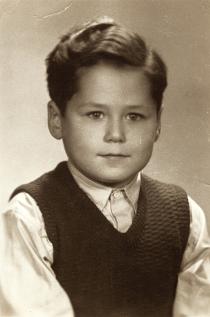That's me. This photo was taken in Warsaw during World War II.
In 1939 I lived in Warsaw at 56 Nowolipie Street, in a very beautiful, large house, as a subtenant, with Mr. and Mrs. Berger. Those were young, but religious people. I worked in the Alfa confectionery plant, on Mlynarska Street. Some relatives of my paternal cousin, Samsonowicz , who were accountants, recommended me. The factory was owned by Jews, two brothers named Wajdenfeld. I worked as a bookkeeper, in the office, clattering away on the typewriter, learned some basic bookkeeping and that's how I made my living.
Before the war actually began, there were preparations, fake alarms, that kind of thing. There was a nurse in every house, with a first-aid kit, to help if need be. I also received first-aid training. To prevent the Germans from entering Warsaw, we dug trenches in the Smocza Street area. I later saw what use those trenches turned out to be, when the motorized German army rolled into Warsaw . They didn't have a single horse? First came the motorcycles, then the tanks.
The first air raid. I was downtown, on Marszalkowska. Doing some business, and suddenly - the alert. We knew what to do. Jump into the nearest gate, because in every house there was a civil defense committee, there was a basement to hide, gas masks? So we're crowding into the gate. Suddenly we hear - the swish of falling bombs. This isn't an alert, this is for real. 'Here we are!' they demonstrated.
In the meantime, they seized the whole of Poland. Warsaw defended itself until the very end. I was still able to call my parents but soon the telephones were cut off. When the war started, I demonstrated with others in front of the French and British embassies - come help us! Starzynski, the president of Warsaw, a decent, wonderful man, ran the defense effort . He gave instructions until the last moment, ordered the men to evacuate from the city. We received all that because we had a radio at the factory. But when the daily air raids began, they didn't let me go anymore.
As long as the Warsaw Ghetto was open, I went to work, because it wasn't far, in Wola. They no longer paid us in money but still they paid us in kind. Chocolate products, couverture, that sort of thing. The factory had its own water intake, own power plant, and its employees formed a superb team. The owners had a brother-in-law, Kostrzewa, who wasn't a Jew. He later became the plant's ?Treuhänder.? They both emigrated to America later. The factory had huge basements with big stocks of sugar, condensed milk, and all kinds of ready products. And when the war started, they didn't lock that away. There was a wide entry gate, they opened it, and people queued up for those products. They sold everything out to the last piece of candy. I slept at the factory in case of an intense air raid. There was terrible hunger. People cut dead horses in pieces. The stores were empty, water had been cut off; you took water from the Vistula. There was no electricity, everyone used carbide lamps.
Apolonia Starzec
Share
Photos from this interviewee
The Centropa Collection at USHMM
The Centropa archive has been acquired by the United States Holocaust Memorial Museum in Washington, DC.
USHMM will soon offer a Special Collections page for Centropa.
Academics please note: USHMM can provide you with original language word-for-word transcripts and high resolution photographs. All publications should be credited: "From the Centropa Collection at the United States Memorial Museum in Washington, DC". Please contact collection [at] centropa.org.

